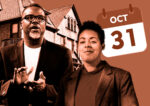In a major win for Mayor Brandon Johnson and a blow to the real estate industry, his campaign promise to hike Chicago’s property transfer taxes secured a key City Council vote Tuesday on its way to a likely March decision by voters.
After the measure advanced in a 32 to 16 vote, the proposal will likely get final approval at Wednesday’s full city council meeting — which would put the measure on the March primary ballot. Its opponents may try to delay its final passage, though.
Once it does head to voters, it’s expected to kick off a heated referendum campaign between the policy’s advocates who believe it will combat homelessness and a real estate industry concerned about its potential adverse effects on an already subdued market.
Johnson’s goal for the proposal, known as Bring Chicago Home, is to utilize extra tax revenue stemming from increased transfer taxes — a one-time fee charged upon purchasing a property — to fund more affordable housing projects and curb the city’s homeless population.
Alderman Brendon Reilly, one of the votes against, grilled the mayor’s office and various city departments on how money allocated toward homelessness by former Mayor Lori Lightfoot’s budgets has been spent.
“That’s my concern here,” Reilly said. “We’re going to ask folks to pay more taxes for another $100 million, yet I still can’t get a straight answer on where the $200 million we allocated for this year has gone, where it’s been spent, and if there’s been a return on investment. Those are all very rational questions for anyone to ask, because we’re talking about the taxpayers’ money.”
The current transfer tax rate is 0.75 percent for all property purchases, regardless of price. Johnson’s proposal, however, would raise the rate to 2 percent for any portion of a sale price over $1 million and 3 percent for any portion of a sale greater than $1.5 million, while lowering the rate to 0.6 percent on the first $1 million of a sale.
It effectively would mean all sales for less than $1 million would be getting a slight break in the transfer taxes cut out of the deal while it would be raised significantly for large deals, impacting a huge swath of commercial properties.
The meeting grew contentious, with housing advocates and representatives from real estate trade organizations debating the potential downsides of the proposal.
“The fear mongering you’re hearing from the real estate industry is dishonest. They’re lying to you.” Dominique Chew, a policy and advocacy manager with AIDS Foundation of Chicago.
Farzin Parang, the executive director of office building industry group BOMA, expressed concern for how an additional tax would impact the downtown office market, a sector struggling with rising interest rates, record-high vacancy and nine-figure foreclosures. He also challenged the way advocates have framed it as only a “mansion tax” when the majority of the added tax revenue will come from commercial properties.
“Nobody contests that we have a housing crisis,” he said. “We have a migrant crisis, we have a homelessness crisis — our challenge with this proposal’s funding stream is that you’re adopting a rhetoric about mansions and excess, sort of a moral ‘let’s punish the rich people,’ that doesn’t apply to office buildings. Office buildings are not mansions, they’re not people, they’re economic activities.”
Read more




The proposal’s advancement comes after years of starts and stops. Lightfoot’s support for a similar measure appeared to fizzle out last year when proponents of a transfer tax hike requested to bring it to a council vote, but the special meeting set to consider the measure fell short of a quorum of officials.
Should the full council approve the measure Wednesday, it will go to voters in March, and if it passes with a simple majority in support, the ordinance would then return to council so aldermen can sort out the finer points of how the revenue would be allocated.
